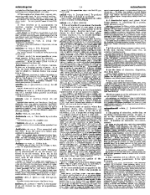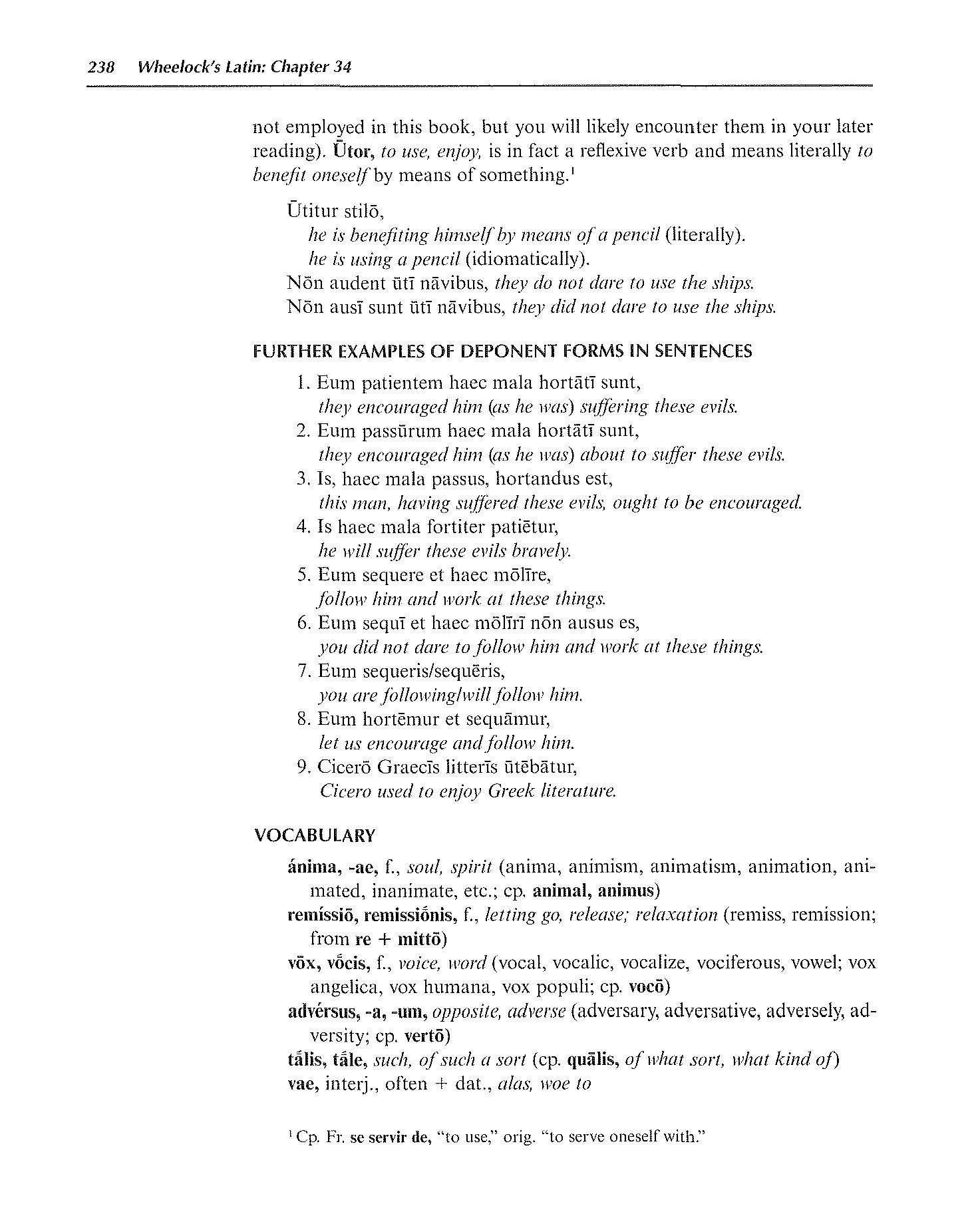
page_listing.tpl
page_subListingDetails.tpl
sub_listingDetails_style1.tpl
sub_listingDetails.title.tpl
anima soul
anima is a Latin Noun that primarily means soul.
Definitions for anima
Wheelock's Latin
Noun
- 1
soul, spirit
English derivatives:
anima animism animatism animation animated inanimate
Oxford Latin Dictionary
Noun
- 1
The air breathed by an animal, the breath. (b) (phrs.; cf. also sense 2) ~am agere, to gasp for breath; (esp. of a dying person) to be in the death agony, breathe one's last; ~am ducere, to draw breath; ~am edere, efflare, emittere, exspirare, etc., to breathe one's last, die; ~am trahere, to labour for breath.
- 2
Breath or breathing as the characteristic manifestation of life (as opposed to death.
- 3
The characteristic or quality whose loss constitutes death, life, consciousness; ~a deficit, (the person) faints. (b) the life of an individual, a life. (c) (regarded as being located in a definite part of the body) a vital spot.
Sentences with anima
Latin to English
Eurydicen vox ipsa et frigida lingua a miseram Eurydicen! Anima fugiente vocabat.Compare That cold, cold tongue cried out "Eurydice!" cried "Poor Eurydice!" as the soul of the singer fled.
Atqui fine sub ultimo peccatrix anima stultitiam exuat: saltem voce Deum concelebret, si meritis nequit. [Liber Cathermerinon, Praefatio, 31]Compare And so, as my last day approaches, let my sinful soul divest itself of its folly; let it at least celebrate God in words, if it cannot in deeds.
Cum ...te, deum meum, quaero, vitam beatam quaero. Quaeram te, ut vivat anima mea.Compare When I seek you, my God, I seek the happy life. Let me seek you "so that my soul may live."
O curvae in terris animae et Caelestium inanis!Compare O souls bowed to earth and void of all heavenly thoughts!
Declension table for anima
Cactus2000
| Singular | Plural | |
| Nom. | anima | animae |
| Gen. | animae | animārum |
| Dat. | animae | animīs / -ābus |
| Acc. | animam | animās |
| Abl. | animā | animīs / -ābus |
Data sources
Notes
- Definitions
- Frederick M. Wheelock, Wheelock's Latin, 6th ed., rev. Richard A. LaFleur (New York, NY: HarperCollins Publishers, 2005): 234.
- P. G. W. Glare, Oxford Latin Dictionary, Vols. 1-8 (Oxford: Clarendon Press, 1982): 132.
- Word frequencies
- Christopher Francese, "Latin Core Vocabulary," Dickinson College Commentaries, last modified 2014, http://dcc.dickinson.edu.
- Paul B. Diederich, The Frequency of Latin Words and Their Endings, PhD diss., (Columbia University, 1939).
- Louis Delatte, Suzanne Govaerts, Joseph Denooz, and Etienne Evrard, Dictionnaire fréquentiel et index inverse de la langue latine [Frequency Dictionary and Inverse Index of the Latin Language] (Liège, Belgium: Laboratoire d'analyse statistique des langues anciennes de l'Université de Liège [L.A.S.L.A.], 1981): 124.
Bibliography
Allen, Joseph H. Allen and Greenough's New Latin Grammar for Schools and Colleges: Founded on Comparative Grammar. Edited by James B. Greenough, George L. Kittredge, Albert A. Howard, and Benjamin L. D'Ooge. Boston, MA: Ginn & Company, 1903.
Crystal, David. A Dictionary of Linguistics and Phonetics. 6th ed. Oxford, UK: Blackwell Publishing, 2008.
Delatte, Louis, Suzanne Govaerts, Joseph Denooz, and Etienne Evrard. Dictionnaire fréquentiel et index inverse de la langue latine [Frequency Dictionary and Inverse Index of the Latin Language]. Liège, Belgium: Laboratoire d'analyse statistique des langues anciennes de l'Université de Liège (L.A.S.L.A.), 1981.
Diederich, Paul B. The Frequency of Latin Words and Their Endings. PhD diss., Columbia University, 1939.
Francese, Christopher. "Latin Core Vocabulary." Dickinson College Commentaries. Last modified 2014. http://dcc.dickinson.edu/latin-vocabulary-list.
Gildersleeve, Basil L., and Gonzales Lodge. Gildersleeve's Latin Grammar: Third Edition, Revised, and Enlarged. 3rd ed. London, England: Macmillan and Co., 1903.
Glare, Peter G.W. Oxford Latin Dictionary. Vols. 1-8. Oxford, England: Clarendon Press, 1982.
Krüger, Bernd. "Latin Conjugation Tables." Cactus2000. Accessed May 5, 2023. https://latin.cactus2000.de/index.en.php.
Pierson, Nick. "Sound of Text." Accessed October 26, 2019. https://soundoftext.com.
Wheelock, Frederick M. Wheelock's Latin. 6th ed. Revised by Richard A. LaFleur. New York, NY: HarperCollins Publishers, 2005.
Wiktionary Contributors. "Victionarium." Wikimedia Foundation, Inc. Updated March 18, 2019. https://la.wiktionary.org/wiki/Victionarium:Pagina_prima.
Citation
Chicago (17th ed.)
Allo Contributors. "anima, animae (n.) - Latin Word Definition." Allo Latin Dictionary. Last modified . Accessed February 21, 2026. http://ancientlanguages.org/latin/dictionary/anima-animae.
Entry created on . Last updated on .







